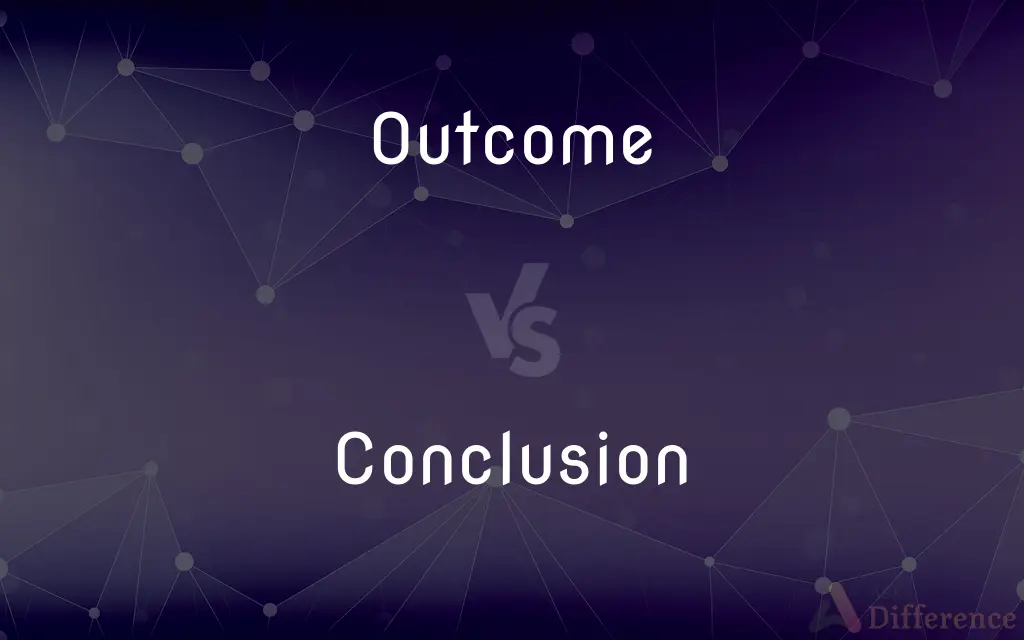Outcome vs. Conclusion — What's the Difference?
By Urooj Arif & Fiza Rafique — Updated on March 26, 2024
Outcome refers to the result of an event or process, while Conclusion is a judgment or decision reached after consideration.

Difference Between Outcome and Conclusion
Table of Contents
ADVERTISEMENT
Key Differences
An "outcome" is the final result or effect of an action, decision, or series of events. It is often used to describe the end result of complex processes or activities, particularly those with uncertain or variable factors. In contrast, a "conclusion" is the final part of something, such as an argument or piece of writing, or a judgment reached after consideration. It is the act of concluding or the state of being concluded.
Outcomes are inherently linked to actions and processes, signifying the end result of various inputs and influences. They are observed and measured in terms of success, failure, or degrees of achievement, making them crucial in fields like business, research, and healthcare. Conversely, conclusions are drawn from data, arguments, or thoughts, marking the endpoint of reasoning or discussion. They are critical in academic writing, legal judgments, and decision-making processes, where establishing a reasoned end is necessary.
The determination of an outcome often involves observation and analysis, as outcomes are the observable results of experiments, projects, or initiatives. This implies a level of objectivity and measurability, where outcomes can be quantified or qualified based on the goals set at the beginning of the process. On the other hand, reaching a conclusion involves synthesizing information and insights to arrive at a final judgment or decision, which can be influenced by subjective interpretation, values, and perspectives.
While outcomes can vary widely depending on the nature of the event or process, such as the outcome of a medical treatment being health improvement or deterioration, conclusions are typically more definitive, representing a closure or resolution. For example, the conclusion of a research paper summarizes the findings and implications, providing a clear end to the discourse.
Outcomes and conclusions, though different, can be interconnected. In many cases, the outcome of a process may lead to the drawing of conclusions, especially in research and analysis, where the results (outcomes) of a study inform the conclusions drawn by the researchers or analysts.
ADVERTISEMENT
Comparison Chart
Definition
The final result or effect of an action.
A judgment or decision reached after consideration.
Usage Context
Describing end results of processes.
Ending discussions, arguments, or writings.
Nature
Objective and measurable.
Subjective and interpretative.
Role in Process
Signifies the end result of actions.
Marks the endpoint of reasoning.
Interconnection
Can influence or determine conclusions.
May be derived from observing outcomes.
Compare with Definitions
Outcome
The result of an action or process.
The outcome of the election was unexpected.
Conclusion
The end or finish of an event or process.
The conclusion of the meeting was that more research is needed.
Outcome
Reflects the end state of a series of events.
The final outcome of the negotiations was satisfactory for all parties.
Conclusion
The last part of something, such as a speech or document.
The report's conclusion summarizes the findings.
Outcome
Can be uncertain until realized.
The outcome of the experiment remains to be seen.
Conclusion
Implies a finality in decision-making.
The board's conclusion was to proceed with the merger.
Outcome
Often evaluated in terms of success or failure.
The outcome of the treatment will determine the next steps.
Conclusion
Represents the synthesis of information.
The conclusion drawn from the study highlighted the need for change.
Outcome
Used to describe the impact of decisions.
The company's new strategy had a positive outcome on profits.
Conclusion
A judgment or decision reached by reasoning.
Her conclusion after reviewing the data was to invest more in technology.
Outcome
An end result; a consequence.
Conclusion
The close or last part; the end or finish
The conclusion of the festivities.
Outcome
That which is produced or occurs as a result of an event or process.
A quality automobile is the outcome of the work of skilled engineers and thousands of workers.
Conclusion
The result or outcome of an act or process
What was the conclusion of all these efforts?.
Outcome
(probability theory) The result of a random trial. An element of a sample space.
Three is a possible outcome of tossing a six-sided die.
Conclusion
A judgment or decision reached after deliberation.
Outcome
(education) The anticipated or desired results or evidence of a learning experience often used in the phrase learning outcomes.
The outcomes of this course are outlined in your syllabus.
Conclusion
A final arrangement or settlement, as of a treaty.
Outcome
The scoreline; the result.
Conclusion
(Law) The formal closing of a legal complaint or pleading.
Outcome
That which comes out of, or follows from, something else; issue; result; consequence; upshot.
All true literature, all genuine poetry, is the direct outcome, the condensed essence, of actual life and thought.
Conclusion
A proposition that follows from the premises of a formal proof, for instance from the major and minor premises of a syllogism.
Outcome
Something that results;
He listened for the results on the radio
Conclusion
The proposition concluded from one or more premises; a deduction.
Outcome
A phenomenon that follows and is caused by some previous phenomenon;
The magnetic effect was greater when the rod was lengthwise
His decision had depressing consequences for business
He acted very wise after the event
Conclusion
The end, finish, close or last part of something.
Conclusion
The outcome or result of a process or act.
Conclusion
A decision reached after careful thought.
The board has come to the conclusion that the proposed takeover would not be in the interest of our shareholders.
Conclusion
(logic) In an argument or syllogism, the proposition that follows as a necessary consequence of the premises.
Conclusion
(obsolete) An experiment, or something from which a conclusion may be drawn.
Conclusion
(law) The end or close of a pleading, for example, the formal ending of an indictment, "against the peace", etc.
Conclusion
(law) An estoppel or bar by which a person is held to a particular position.
Conclusion
The last part of anything; close; termination; end.
A fluorish of trumpets announced the conclusion of the contest.
Conclusion
Final decision; determination; result.
And the conclusion is, she shall be thine.
Conclusion
Any inference or result of reasoning.
Conclusion
The inferred proposition of a syllogism; the necessary consequence of the conditions asserted in two related propositions called premises. See Syllogism.
He granted him both the major and minor, but denied him the conclusion.
Conclusion
Drawing of inferences.
Your wife Octavia, with her modest eyesAnd still conclusion.
Conclusion
An experiment, or something from which a conclusion may be drawn.
We practice likewise all conclusions of grafting and inoculating.
Conclusion
The end or close of a pleading, e.g., the formal ending of an indictment, "against the peace," etc.
Like the famous ape,To try conclusions, in the basket creep.
Conclusion
A position or opinion or judgment reached after consideration;
A decision unfavorable to the opposition
His conclusion took the evidence into account
Satisfied with the panel's determination
Conclusion
An intuitive assumption;
Jump to a conclusion
Conclusion
The temporal end; the concluding time;
The stopping point of each round was signaled by a bell
The market was up at the finish
They were playing better at the close of the season
Conclusion
Event whose occurrence ends something;
His death marked the ending of an era
When these final episodes are broadcast it will be the finish of the show
Conclusion
The proposition arrived at by logical reasoning (such as the proposition that must follow from the major and minor premises of a syllogism)
Conclusion
The act of ending something;
The termination of the agreement
Conclusion
A final settlement;
The conclusion of a business deal
The conclusion of the peace treaty
Conclusion
The last section of a communication;
In conclusion I want to say...
Conclusion
The act of making up your mind about something;
The burden of decision was his
He drew his conclusions quickly
Common Curiosities
Can an outcome lead to a conclusion?
Yes, outcomes often provide the basis for drawing conclusions, especially in research and analysis.
Is an outcome always objective?
Outcomes are generally objective and measurable, but the interpretation of their significance can be subjective.
Can there be multiple outcomes but a single conclusion?
Yes, a process can have multiple outcomes, but these can lead to a singular, overarching conclusion.
What is the difference between an outcome and a conclusion?
An outcome is the final result of a process, while a conclusion is a judgment or decision made after analyzing information.
How does a conclusion differ from a summary?
A conclusion offers a final judgment or decision, often with insights or implications, while a summary merely recaps information without additional analysis.
Can outcomes be predicted accurately?
Outcomes can sometimes be predicted based on past data and trends, but uncertainty factors can affect accuracy.
Is the conclusion always based on outcomes?
Conclusions are often based on outcomes but can also derive from theoretical reasoning or argumentation without direct outcomes.
Do outcomes have a direct impact on decisions?
Outcomes significantly influence decisions, as they provide real-world results that inform future actions.
Can personal bias affect conclusions?
While conclusions should be reasoned and evidence-based, personal bias can influence the interpretation of outcomes.
What role do outcomes play in project management?
Outcomes are key in project management for evaluating success, guiding future strategies, and making informed decisions.
Why is it important to distinguish between outcomes and conclusions?
Distinguishing between them is important for clarity in communication, especially in academic, professional, and scientific contexts.
Can the outcome of an event change over time?
Yes, the immediate outcome may evolve, especially in dynamic situations or as further effects become apparent.
How important is the conclusion in academic writing?
The conclusion is crucial as it encapsulates the main findings and implications, offering closure and insight.
How do outcomes and conclusions relate to evidence-based practices?
In evidence-based practices, outcomes provide the evidence, while conclusions are drawn from this evidence to inform practice and policy.
How is a conclusion formulated in scientific research?
In scientific research, conclusions are formulated based on the analysis of data and outcomes, reflecting the study's contributions to knowledge.
Share Your Discovery

Previous Comparison
Strategy vs. Technique
Next Comparison
Destination vs. DestinyAuthor Spotlight
Written by
Urooj ArifUrooj is a skilled content writer at Ask Difference, known for her exceptional ability to simplify complex topics into engaging and informative content. With a passion for research and a flair for clear, concise writing, she consistently delivers articles that resonate with our diverse audience.
Co-written by
Fiza RafiqueFiza Rafique is a skilled content writer at AskDifference.com, where she meticulously refines and enhances written pieces. Drawing from her vast editorial expertise, Fiza ensures clarity, accuracy, and precision in every article. Passionate about language, she continually seeks to elevate the quality of content for readers worldwide.














































